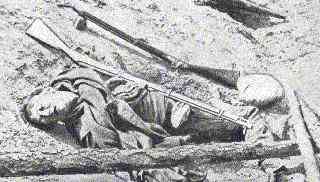ALL QUIET ALONG THE POTOMAC
(LAMAR FONTAINE/JOHN HILL HEWITT) (1861)





One of the most appealing among the hundreds of songs concerning the life of the soldier in the army was "All Quiet Along The Potomac." During the long periods between major battles and campaigns, a soldier's main assignment was the lonely one of picket and sentry duty. The song was based on an actual incident claimed as having taken place during the time of inactivity following the first Battle of Bull Run [21 Jul 1861], while the forces of both sides were gathering strength. For many days the newspapers could merely report in their headlines "All Quiet Along the Potomac," for there were no major battles to describe, and the people were in a tense period of expectation of great events in the future.
According to the story, a Confederate soldier, said to be Lamar Fontaine of the Second Virginia Cavalry, was standing night guard on a lonely outpost with one of his best friends, John Moore. After completing his six-hour assignment, he awakened his sleeping friend to take over. Moore stirred the glowing coals of the fire. The flames which leaped up revealed the position to the enemy pickets stationed on the opposite bank of the Potomac River, and made him a perfect target, framed in the fire's light. The bullet of a Union sharpshooter found its mark in Moore.
As he determined that his friend had been killed, Fontaine's eyes fell upon the headlines of a newspaper lying on the ground: "All Quiet Along the Potomac." The next day he wrote the poem....
So popular was the work, set to music by both Northern and Southern composers, that the commanders of the opposing forces, the Union Army of the Potomac and the Confederate Army of Northern Virginia, issued a joint order prohibiting the barbarous custom of picket fire, again exhibiting the powerful influence which a song can exert in times of war.C. A. Brown (revised by Willard A. Heaps), The Story of Our National Ballads, New York, NY, 1960, pp. 210-212.


"All quiet along the Potomac," they say,
Except now and then a stray picket
Is shot as he walks on his beat to and fro,
By a rifleman hid in the thicket.
'Tis nothing. A private or two now and then
Will not count in the news of the battle;
Not an officer lost. Only one of the men
Moaning out all alone the death rattle.All quiet along the Potomac tonight,
Where the soldiers lie peacefully dreaming,
Their tents in the rays of the clear autumn moon,
O'er the light of the watch fires, are gleaming;
There's only the sound of the lone sentry's tread
As he tramps from the rock to the fountain,
And thinks of the two in the low trundle bed,
Far away in the cot on the mountain.His musket falls slack, and his face, dark and grim,
Grows gentle with memories tender,
As he mutters a prayer for the children asleep,
For their mother, may Heaven defend her.
The moon seems to shine just as brightly as then
That night when the love yet unspoken
Leaped up to his lips when low-murmured vows
Were pledged to be ever unbroken.Then drawing his sleeve roughly over his eyes,
He dashes off tears that are welling,
And gathers his gun closer up to its place
As if to keep down the heart-swelling.
He passes the fountain, the blasted pine tree,
The footstep is lagging and weary;
Yet onward he goes, through the broad belt of light,
Toward the shades of the forest so dreary.Hark! Was it the night wind that rustled the leaves?
Was it moonlight so wondrously flashing?
It looks like a rifle -- "Ah! Mary, good-bye!"
And the lifeblood is ebbing and splashing.
All quiet along the Potomac tonight,
No sound save the rush of the river;
While soft falls the dew on the face of the dead --
The picket's off duty forever.

